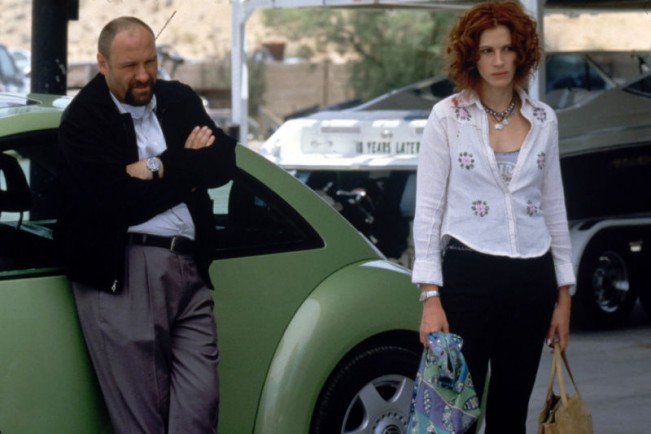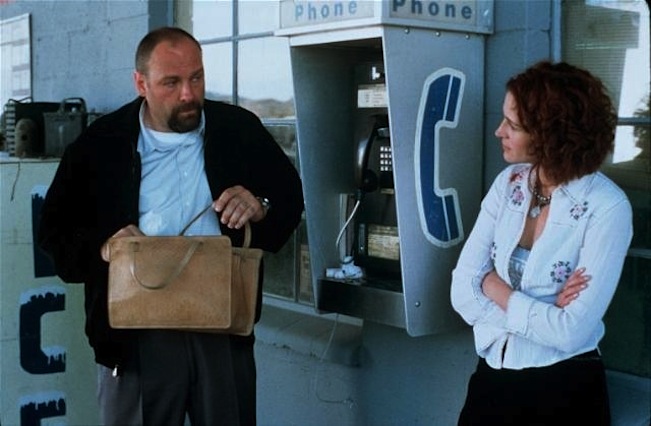

By Ray Pride Pride@moviecitynews.com
A James Gandolfini interview for THE MEXICAN (February 2001)
An interview constructed from a press junket roundtable for The Mexican, on assignment for a since-disappeared website. Even at the pokiest questions, Gandolfini was affable, still charmed with sly smiles.
The Mexican is a comic road movie that plays like Sam Peckinpah having his way with a Road Runner cartoon: oddball jokes and sudden violence intermingle in a cheerful, entertaining shaggy dog star vehicle. Brad Pitt plays a doofus named Jerry, who’s breaking up with girlfriend Samantha (Julia Roberts) in the opening scene because she says he’s being “such a fucking moron.” He’s been called upon for an only-in-the-movies “last job” before he can sever his debts to the mob; to retrieve a priceless nineteenth-century pistol that has curse and legend written all over it. The Mexican grants James Gandolfini opportunities to steal scenes from both Pitt and Roberts, which he does with effortless charisma. Most of Roberts’ scenes are with 39-year-old star of “The Sopranos,” and that’s all right with her: she says she’s ready to start a “church of Gandolfini.” Playing a possibly gay hitman named Leroy, Gandolfini finds a sensitive guy who just doesn’t “get” relationships. (The script also has its mean fun with Roberts’ character, who can’t open her mouth without half-digested therapy-speak spurting out.) “You’re a very sensitive person for a cold-blooded killer,” Samantha observes, a line which may explain a lot about what Gandolfini is capable of as an actor after a career in supporting parts in movies like Strange Days and 8MM. Some of the same unlikely charm comes across when talking to the veteran actor about his work: he’s amusingly abashed at all the attention.
What do you think it makes it so easy to visualize you as a killer?
[laughs] Thanks a lot, man! I honestly have no idea. I think, y’know, I don’t look like Peter Pan, number one. I dunno. I wonder about that myself. One good thing about “The Sopranos” is that I’m getting a lot more parts [where] I’m not yelling, I’m not raping or pillaging. There’s a lot more colors that are coming, thank God, ’cause beating up women gets a little old, y’know. You know, wait, take that back. Don’t put that down! That’s horrible! You know what I mean. These parts, you have to go to such a horrible place. Please don’t put that. You have to go a bad place. It’s not a lot of fun sometimes and something I don’t really want to do anymore.
So you look forward to getting away from bad guys.
Sure. I’d to do a little more comedy. Films like Nobody’s Fool, I don’t know why that comes to mind, not that anybody saw that. Just smaller films with not as much violence, I guess. You’re still a certain kind of type. I’ve had a few offers of wonderful characters, but I haven’t been able to do them, they’re not violent, they’re family situations and I’m pleased with that. I kind of took this role because, first of all, the script had a lot of twists and turns. I didn’t know exactly what was going to happen. A lot of scripts you read, you can see a lot of stuff coming. I didn’t really see that in this one. But I didn’t have a ton of time. So I didn’t want to do something where I had to do a lot of research or change a lot of rhythms for? Does that make sense? Because I would have to have done this movie and then gone back to “Sopranos.” I didn’t want to do a huge shift. This seemed to fit in a lot of areas. Plus… Brad and Julia, obviously. And Gore. I met [director] Gore [Verbinski]. It wasn’t like a career decision. It was like, I met these people, I said, Gore is smart. He knows what he’s doing, I mean, y’know, you really can’t go wrong [with good people].
Is there pressure to capitalize on the response to the show?
Some. Sure. There’s more than there were. There’s a lot of good stuff. The whole circumstance of this movie [with its low budget and rapid production] was different. Plus I got a lot of phone calls from people…. “Do this.”
Are there actors whose careers you can learn from?
I think Ed Harris has a great career, Jeff Bridges. Good films. You don’t see these guys embarrassed by the films they choose.
When you read the script and saw you’d be playing a gay hitman, did it seem like a trick or a gimmick of some kind?
I didn’t want it to be any kind of gimmick. If I was going to do it, I was going to do it from a point of, I guess realism is the word. It didn’t strike me as a gimmick.
Was your career just fine for you before “Sopranos” became the hit that it is?
I’m trying to remember. Yeah, things were going fine. I mean, what do I have to complain about? I was number five or six on the call sheet, I do a couple weeks work, get paid nice. Yeah, things were okay. I was trying to steer away then from some of the violent stuff, but then I took 8MM, so… As you get a little older, you want to do [other things].
So it would have been okay if stardom never came?
Yes. It was okay if it never came. I thought, y’know, what I was doing was fine.
What part of your personality makes us like you even though the characters do bad things?
Well, first of all, I think it’s the character that you’re… I don’t think it’s me at all. I think it’s the writing of a character that shows a broad spectrum of emotions. They show a person: because of the writing, you see a person. I’m sure Jeffrey Dahmer had good days where he would, y’know, try to be friendly to people. [laughs]
It’s funny to see your character turning all philosophical with Julia in the desert diner. It’s funny because it’s simple, but peculiar.
The character is a thinker in his own way. I can see him sitting in his apartment, sitting there thinking about why he can’t have a relationship, which is so odd. It cracked me up. I don’t know if it’s funny in the film, but it cracked me up: this gorilla sitting there, “Why can’t I have a relationship!” Banging his head against the wall or something.
Do have the room to take on more than one movie a year?
I can usually fit in a movie. I usually work seven or eight months, then I want to do a movie. It keeps you fresh. [The series] is a lot of work. It’s worth it. But it’s a lot of work. As long as the show has something to say, if it becomes, “This week Tony’s couch is missing… ”
When did the success of the show hit you?
I think it was when the New York Times said something. Something or other about the pop culture of the last twenty-five years. [laughs] That was… different. There’s no way to respond to it, really. We’re still doing the show the same way. A few more people hanging around.
People are generally nice. Almost everybody is pretty cool. I’ve had very few problems.
Any wiseguys come up to shoot the shit?
[deadpan] I don’t want to go into that. [laughs] People are very nice if you just take a minute. But you still got to take out the garbage.
Ready to be a romantic lead?
[laughs] I don’t know about that!
Women are attracted to Tony’s character.
Yeah. I think that little box has amazing power.
So you’re content with the path that brought you here.
Looking back, I made some mistakes, that’s for sure. Overall, I’m pretty pleased. I think now is the opportunity to really fuck it up! I’ve got more choices now, I can really screw up now! Before there weren’t that many, it was this or this…
Would you consider taking a Clint Eastwood kind of route to change your image, go to Europe and make movies there?
I’d love to do films in Europe, sure. I did a film in France and I loved it. The film didn’t do so well, but… Look at Gene Hackman, the stuff he does. He’s had a wonderful career. If I could be lucky enough to do half the quality of stuff he does the way he does it, that would be a dream.
Do you miss anything that was taken out of any of the films you’ve been in?
There are great scenes that are taken out of films for [pacing]. I’ve watched scenes being filmed, I’m like, Jesus Christ, that was great, then I go to the movie. And it wasn’t me, it was two guys that I saw, and it was taken out of the movie, and they told me why. But I was like, “Oh if I was that actor! Man!”
You slimmed down a little for this movie.
I had an idea for the character in the beginning, I started to get skinny. Then, about halfway through, I said, I don’t need to do this. Because it didn’t really matter! That felt good, losing some weight, then I was out in the desert, sweating, so I lost some more anyway. You can’t really tell, I look the exact same in the film. But I lost about fifteen or twenty pounds, but I looked the same, so I said, what’s the difference?
How uncomfortable are you right now?
Not too bad. Why? Do I look that uncomfortable? Do I really? It’s part of the job. Wow. I didn’t think I looked that uncomfortable?
You ever have to pay for a meal in a New Jersey restaurant nowadays?
I think they charge me more now!
















